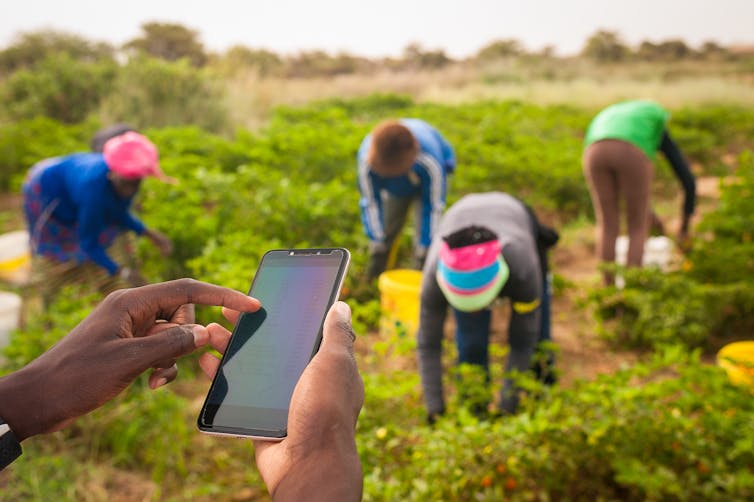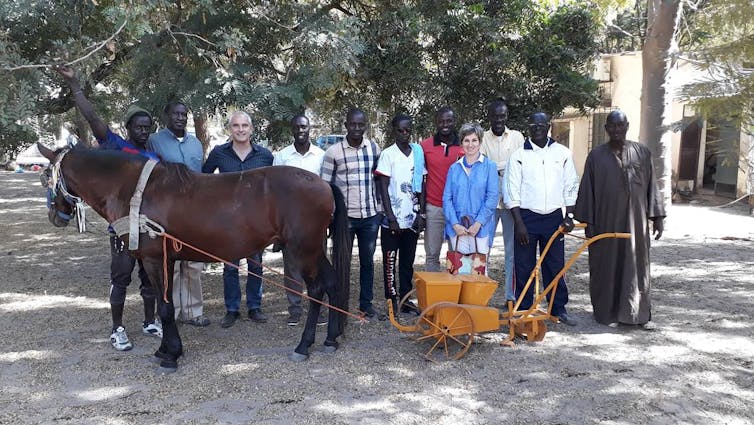Insights from Senegal: involving farmers in research is key to boosting agriculture

CTA ACP-EU/Flickr
Antoine Le Quéré, Institut de recherche pour le développement (IRD) and Tatiana Krasova Wade, Institut de recherche pour le développement (IRD)
In West Africa, agricultural production tends to fluctuate. This is because of the combined effect of several factors, including insufficient and irregular rainfall, poor or saline soils, low levels of inputs, and parasites. These present major challenges to the region’s food and nutritional security, the fight against rural poverty and the pursuit of sustainable agriculture.
To address these challenges, studies recommend various growing practices that can improve how much is produced from farms and forests. One of these is the use of symbiotic micro-organisms as biofertilisers. This is when micro-organisms live on plants and develop a mutually beneficial relationship with them.
But the practice of using micro-organisms isn’t widespread in West Africa. This is mainly because farmers aren’t involved in the applied research projects and do not know how to use the research results.
In Senegal, research on how to get more farmers to use symbiotic micro-organisms is being carried out by the Shared Microbiology Laboratory. This brings researchers together from the French Development Research Institute, the Senegalese Agricultural Research Institute and Cheikh Anta Diop University in Dakar. The aim is to improve farmer knowledge about symbiotic micro-organisms, how to use them and how to assess their effects on crop production through field experiments.
We have now tested and developed a model and found it to be a huge success because farmers participated in it. Their concerns – including their knowledge and practices – were taken into account. This ultimately facilitated the project’s adoption and dissemination.
We are now waiting for it to be rolled out across the country.
Inclusive approach
The basis of our model is inoculation – when micro-organisms are brought to plants. It’s a simple technique where fungi or bacteria are applied, usually to seeds. These then provide the plant with nutrients – such as nitrogen, phosphorus and minerals – that are often lacking in the soils of arid and semi-arid regions. This encourages the plant to develop.
Inoculation is well-suited to family farming (especially subsistence farming) because it’s inexpensive and easy to use. So far, the fungi or bacteria have been supplied by the Shared Microbiology Laboratory.
We used an inclusive approach to see how farmers could use micro-organisms through inoculation. We also assessed their effects on crop yields through field trials. This involved learning workshops and collaborative work in the farmers’ fields.
In total, 30 experiments were carried out from the northern region of Saint Louis to Casamance. The idea was for farmers to select the micro-organisms best suited to the crops and soils.
Agricultural technicians from the National Rural and Agricultural Consulting Agency and various nongovernmental organisations then helped to embed the results of the research into cultivation practices.
A digital system is now being developed so that farmers, researchers, consultants and others can communicate and share the results of their work more easily.
Overcoming challenges
This collaborative approach is a long-term endeavour. So far, we have tested cowpea, groundnut, onion, tomato, okra, watermelon, sorghum, millet, maize, fonio, chilli and cassava. Some crops have responded very well to inoculation and this has increased the demand for micro-organisms.
We found this challenge could be met by outsourcing the production of mycorrhizal fungi inoculants to farmers. This is a great way to create new income for farmers.
Mycorrhizal fungi “starters” will be produced and checked at the Shared Microbiology Laboratory in Dakar. They will then be provided to the inoculant producer, who will grow them locally.

Author provided
Another challenge was how to apply the biofertiliser once it is produced.
The work of craftsmen, researchers, agricultural advisors and farmers led to the development of a machine called the “yookoutef”. This is a traditional seeder which can, while seeding, inoculate precise quantities of mycorrhizal fungi onto the seed. The “yookoutef” was made by Senegalese artisans from the Association for the Promotion of Artisans and Workers. It is now protected by intellectual property rights at the African Intellectual Property Organisation.
The machine helps reduce the intensity of farm labour and promotes inoculation technology. It was tested for the first time on large surface areas last year and has since attracted the interest of several farmers’ organisations.
On the back of this success, the partners are looking to a new shared goal, that of setting up a production chain for biofertilisers made from symbiotic micro-organisms with a “participative system guaranteed” label. These are participatory guarantee systems that take the entire value chain into account.
This production chain would bring together farmers, producers and suppliers of inoculants, agricultural consultants, researchers, development partners and consumers. Such systems are set up to make sure farmers benefit from meeting quality standards and to encourage the local adoption of innovations.
Translated from the French by Alice Heathwood for Fast ForWord![]()
Antoine Le Quéré, Chercheur en écologie microbienne, Institut de recherche pour le développement (IRD) and Tatiana Krasova Wade, Chercheur en biologie végétale, Institut de recherche pour le développement (IRD)
This article is republished from The Conversation under a Creative Commons license. Read the original article.



Leave a Reply
Want to join the discussion?Feel free to contribute!